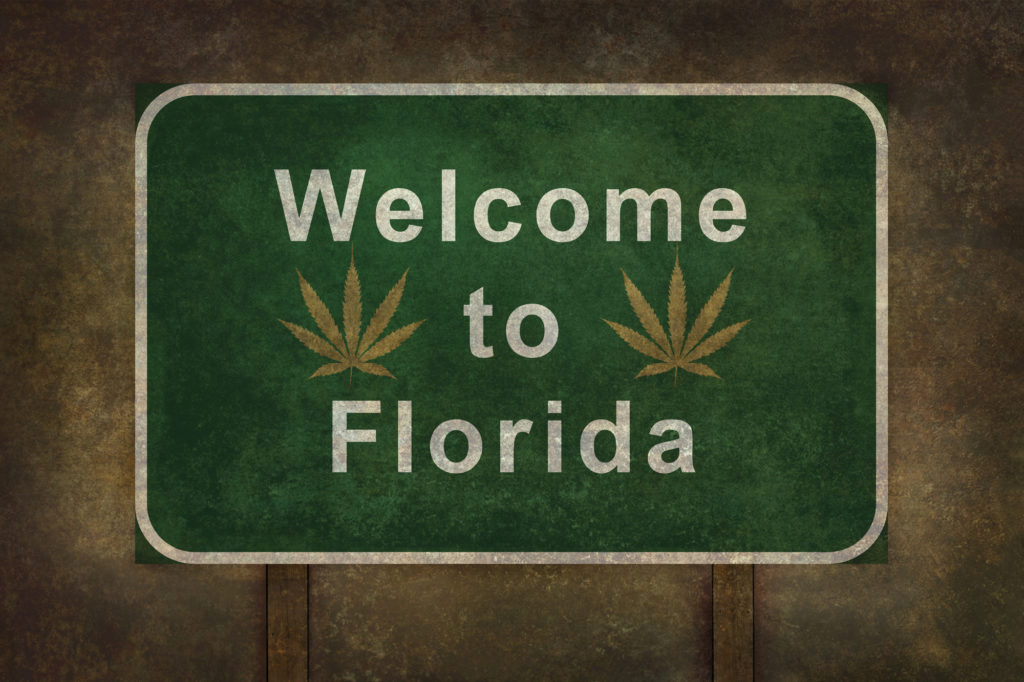
In 2016, Amendment 2 was signed into law by Governor Rick Scott. The amendment offers Florida medical marijuana protections to constituents.
But the state’s interpretation of the law has many chronically ill Floridians jumping through hoops to get relief from legal weed.
This included a caveat that people who need medical marijuana mustn’t smoke it.
In response, lawyer and marijuana activist, John Morgan, popularized the hashtag #NoSmokeIsAJoke.
But a 2018 court decision handed down by Tallahassee has ruled in favor of the people’s right to use pot how they please to treat qualifying illnesses.
Here’s what you need to know about Florida’s marijuana laws:
Florida’s Law Supports Medical Marijuana
Florida’s marijuana laws are a far cry from those in states like Oregon, Washington and others who have lifted restrictions on the plant.
But still, medical marijuana legislation is a big step for the state that is best known for “Florida Man” and face-eating zombies.
For the People: a Victory Up in Smoke
Up until pot laws became his torch to carry, John Morgan was best known for being a car accident attorney who’s TV commercials always ended with him enthusiastically using the slogan: “For the People!”
After watching how medical cancer management affected members of his own family, Morgan started People United, a group dedicated to getting a pot amendment on the ballot. And thus Morgan became Florida’s best-known pot attorney and advocate.
People United operating under the banner “UnitedForCare” ultimately did get the legislation on the ballot.
And after a majority vote in favor of medical marijuana, the victory was short-lived because the Florida Legislature contended that it wasn’t a large enough majority to be signed into law.
But the 2014 defeat was put to the test two years later when People United was once again instrumental in getting medical marijuana onto the ballot. And this time the vote stuck, medical marijuana was signed into Florida law.
While that should have been the end of it, the Florida Legislature wasn’t about to go down without a fight.
In 2017, they passed SB 8A, which would ban the use of smokeable marijuana, citing a number of health concerns.
And in 2018, a Tallahassee judge ruled against SB 8A, suggesting it contradicts the nature of the original medical marijuana law and is unconstitutional. But that decision will likely see an appeal from the defendants, Florida legislatures.
Qualifying Conditions
If all of this back-and-forth is giving you whiplash, unfortunately, that’s not a qualifying condition for Florida constituents seeking medicinal herb.
Other conditions that commonly benefit from marijuana, like Alzheimer’s and a number of mental health conditions, also don’t make the cut.
Today, only a small list of conditions qualify for medical marijuana in Florida.
These are:
- Cancer
- Epilepsy
- Glaucoma
- HIV
- AIDS
- PTSD
- Amyotrophic lateral sclerosis (ALS)
- Crohn’s disease
- Parkinson’s disease
- Other terminal illnesses; and
- Sometimes anxiety or similar conditions as recommended by a doctor
If it’s not glaringly obvious there are a lot of gray areas here. And only a short list of conditions can be treated with marijuana in Florida.
How to Get Florida Medical Marijuana
If you have one of these conditions how can you get access to marijuana?
The process looks something like this:
- Obtain a Physician’s recommendation
- File with the state for a medical card
- Recertify to keep it
But it’s easier said than done.
1. Before You Get Started
In order to qualify, you have to have been diagnosed with one of the qualifying conditions and have attempted to treat it in other ways for a minimum of 3 months.
If this is the case, you can request all of your medical records from your attending doctor before hitting up a pot doc.
2. See a Pot Doctor
With your medical records in hand, make an appointment to see a pot doctor. The pot doctor will review your medical history and determine if you qualify.
You can’t go to just any doctor, because doctors who certify patients for marijuana use must have their medical marijuana license in Florida.
These visits cost between $150 and $250. If approved, you’ll be able to move on to the next step in the process.
But before you do, the attending pot doctor has to enter you into the “Compassionate Care Registry”.
That’s the name given to the state-wide list of legal marijuana users by the Florida Legislature as a blatant and unapologetic form of gaslighting.
3. File with the State
Now that you’re feeling compassionately cared for by the same big brother who has always tried to limit your marijuana use at every turn, it’s time to cough up another $75 and file with the state of Florida for your medical card.
This is a relatively straightforward process of sending in your application and fee. The downside here is that it can take a long time to process, as government things sometimes do.
Eventually, your card will be issued and then it’s off to the dispensary.
4. Visit a Dispensary
In Florida, like many states, a dispensary is the term used to describe a place where marijuana can be sold legally to qualified users.
To find a dispensary near you, check out Leafbuyer.
5. Schedule Doctor’s Visits and Recertify As Requested
Florida law specifies that doctors can only issue up to 70 days worth of marijuana doses at a time.
This means that every two months or so a visit to the pot doctor is required to maintain your stash.
Also, you will need to recertify each year to keep your card.
At $150 – $250 per visit, this can result in fees upwards of $1,000 per year in out of pocket office visit expenses, and that’s not counting the cost of the pot.
Budget accordingly if you need to treat your chronic illness with marijuana.
Reefer: Referrals and Referendums
From the limited number of qualifying conditions to referendums attacking pot legislation, and the pending appeals on “smokeable” weed, Florida medical marijuana laws may seem like one big dumpster fire.
But there is a truth that shines brightly from the flames, and that’s Florida has come a long way.
With People United leading the charge, and midterm elections around the corner, voters have an opportunity to shape their state for the better. And that means supporting candidates that seek to loosen the Florida Legislature’s grip on marijuana laws.
For more interesting information on marijuana, click here.

